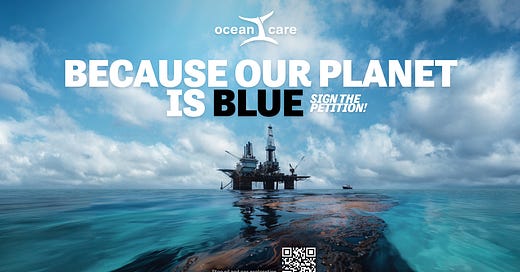Nicolas Entrup is the Director of International Relations for OceanCare, a non-profit based in Waedenswil, Switzerland whose mission is to preserve and improve ocean ecosystems and protect its wildlife. OceanCare seeks to end choking plastic pollution, halt destructive deep sea drilling and mining, and control physically damaging, disorienting, and often fatal noise pollution that endangers marine animals from the smallest krill to the largest whales.
Nicolas has dedicated his professional life to the protection of animals, species, and creating environmental safeguards for more than two decades. He has deep experience fostering multilateral environmental agreements, working on European Union committees, and facilitating critical conversation with decision makers in politics and business. Involved in scientific and policy working groups for the protection of the marine environment, Nicolas focuses on results that bring measurable benefits for marine life.
With OceanCare since 2011, Entrup has helped shape the organization’s strategic direction and enriched it through his profound expertise and extensive network of international contacts. In the organization’s animal and species conservation program, he works on initiatives to end the whale hunting, and since 2018 has been responsible for its program to reduce underwater noise.
While carbon sinks of all kinds are critical to our future, the oceans absorption of heat has been by far the largest in keeping land surface air temperatures livable. That absorption is near capacity and the heat is affecting species migration, resulting in catastrophic coral bleaching, and destroying the livelihoods of millions who depend on our oceans. I am honored that Nicolas reached out to me and hope you will consider his words and join the petition he has shared below.
The oceans are under siege. Not some distant possibility. Not a ‘what if’ scenario. Right now. The very system that regulates Earth’s climate is teetering on the brink. Our oceans are warming, acidifying, and transforming in ways that threaten everything we rely on. This isn’t a future crisis — it’s the crisis unfolding before our eyes. And the global leaders who claim to care about our future? Their actions tell a different story.
From June 9 to 13, diplomats will gather in Nice, France, for the Third United Nations Ocean Conference (UNOC3). It’s billed as the place to shape the future of global ocean governance. The promises will be grand. The speeches will sound urgent. But if this conference does not demand a concrete, binding ban on all new oil and gas exploration, it will be nothing more than a smoke-and-mirrors event — diplomatic theatre that steals time from the world, and allows the oceans to continue dying. Let’s cut to the heart of it: the oceans have been our saving grace. To date, they’ve absorbed more than 90% of the excess heat from global warming. They absorb about 30% of our carbon emissions. Without that buffer, the climate crisis would be unimaginably worse, but instead of protecting this critical system, governments are enabling the fossil fuel industry to plunder it.
This isn’t just environmental mismanagement. It’s a failure of global leadership. It’s the quiet sabotage of a life-saving force for the sake of corporate profits. The UN was supposed to be the last, best hope for global climate action. It wasn’t perfect — slow, bureaucratic, and full of compromises — but it at least had the potential to bring science and diplomacy together. Now? That potential is being hollowed out from within. Fossil fuel interests have wormed their way into the heart of the UN. Petro-states have gutted regulatory frameworks, watered down enforcement mechanisms, and rewritten agreements to favour continued drilling. The oil industry’s fingerprints are all over the Zero Draft and its subsequent versions — the UNOC3 outcome document in its current form. The language is vague. The commitments are recycled. The consequences? Non-existent.
The Zero Draft doesn’t even mention the words ‘oil’ or ‘gas.’ Neither does the outcome document. They refuse to name the problem. They gesture at urgency, but avoid identifying the culprit. It’s diplomatic wordplay — and it’s lethal. If the final agreement mirrors this draft, it will send one stark message: the UN is toothless in the face of petro-power. It will confirm that fossil fuel interests hold the reins inside and outside the UN. That public outcry, scientific warnings, and the pleas of climate-vulnerable nations can be ignored with impunity.
We can’t let that happen.
The science is unequivocal: no new oil and gas exploration is compatible with a livable future. The International Energy Agency says it. The IPCC says it. Even the UN’s own reports say it. Some countries are getting it. France, Portugal, Denmark — including Greenland — and New Zealand are moving toward bans. Spain is leading the charge. But they’re the exceptions, not the rule. Most nations — including major players at UNOC3 — are still licensing new offshore oil and gas projects, even as the oceans literally burn.
If UNOC3 doesn’t break that cycle, if it doesn’t draw a clear, hard line in the sand, it will be complicit. Another summit pretending to bring change, while enabling collapse.
This is a critical moment. Will UNOC3 rise above fossil fuel interests, or will it bow to them? We don’t have to wait for a decision from above. We can make it clear what the world demands. A growing movement is already putting pressure where it matters with a global petition. OceanCare’s Our Planet is Blue, calling for a ban on all new offshore oil and gas exploration. This petition will be delivered straight into UNOC3’s halls, with every signature adding pressure. Every name chips away at the diplomatic fog, forcing decision-makers to take responsibility.
This is not symbolic. This is pressure. Add your name. Share it. Demand that the UN stand up for the oceans at ourplanetisblue.org. The oceans have protected us for millennia. Now, it’s our turn. Don’t let this moment slip by. The future of the planet is at stake.






I have just returned from the Third United Nations Ocean Conference (UNOC3) and while progress was achieved e.g concerning the reduction of underwater noise, the oil industry remains the unaddressed elephant in the room. At least we had the opportunity to address and voice our concerns in Plenary towards country representatives, presenting the call supported by 208 NGOs globally. You can watch the intervention here https://youtu.be/VJT6ENMQeBg?si=rDSA_gjfbQ5D5JOj
So our work to ban offshore gas and oil has not achieved the necessary reaction from policy makers and therefore we are going to reflect, strategize and continue and try increasing our pressure. Thank you for supporting our initiative in the run up to UNOC3. We also have been gaining lots of additional support through it, with 116 630 signatures to the petition – Because Our Planet is Blue! Let’s continue!
They refuse to even address the low-hanging fruit. An enforcable law to stop fishing operations from dumping their used nets in the ocean would be a start. They chide consumers for plastics when these nets are 60% of the plastic in the ocean, and the polymers are arranged to kill fish.